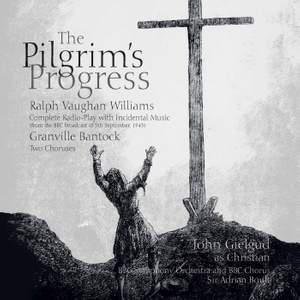Albion records presents (in 2015) the first commercial recording of the 1943 BBC Radio Play, The Pilgrim's Progress, featuring John Gielgud in his prime and music by Vaughan Williams conducted by Adrian Boult.
Vaughan Williams had set his first music to The Pilgrim's Progress in 1906 for a dramatization at Reigate Priory. He also set a 'Pastoral Episode' from Bunyan's allegory in 1922 as his first opera The Shepherds of the Delectable Mountains. The Incidental Music contained on this recording followed in 1942/43 and, finally, Vaughan Williams completed his 'Morality' The Pilgrim's Progress in 1951, revising it in 1952. This life-long association with John Bunyan's allegory has produced works of profound depth, scale, poetry and nobility which cumulatively represent the pinnacle of Vaughan Williams' achievement.
The arranger of The Pilgrim's Progress for radio was Edward Sackville-West (190165), a gifted 'Renaissance Man', equally comfortable as a literary reviewer or as a musicologist. He joined the BBC in 1941. For health reasons he was unable to serve in the Armed Forces in the war and he saw the BBC role as allowing him to make a contribution to the war effort.
Sackville-West sent Vaughan Williams his stage-play in 1942 and Vaughan Williams forwarded the finished score to him in the first week of April 1943. The score for the Incidental Music was: 'A complicated affair, for the music cues are many and intricate, involving a full orchestra, chorus and soloists'. As with all of Vaughan Williams' work on The Pilgrim's Progress, the music superbly fits Bunyan's vision, especially in its rapture, radiance and nobility, epitomised by those unforgettable final Alleluias. With a well-crafted script and an unforgettable central performance by John Gielgud, the cumulative effect of this stage-play is profoundly moving.
Reviews
I can imagine sitting by the radio on that September Sunday evening, with all the madness of the world at war around me, and being deeply moved by this broadcast. Truth to tell, it casts its spell still, some 73 years to the day later, as I listen to it in relative peace. Aside from the expected restrictions in frequency response, and some occasional shattering of sibilants, the sound is quite good. A very small amount of the beginning of the "Vanity Fair" introduction is lost, assumedly from damage or a delay in switching tapes. The erudite notes by Stephen Connock add to the enjoyment and to one's knowledge of this venture. Admirers of the book or composer are urged to make acquaintance of this release, ideally in conjunction with recordings of the later opera, to get full scope of Vaughan Williams's achievement. It is a beautiful and stirring experience. --Ronald E. Grames, Fanfare Magazine, Jan/Feb 2017





